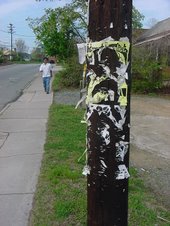Response to 11/11/02 Town Council vote
A couple months ago, it looked like the Chapel Hill Town Council was going to take sensible action on this issue and revise the outdated poster ban.
Now, they've decided to do nothing. I'm not sure what changed their minds, and I would hope it had nothing to do with pressure from Duke Power.
I'd like to think that the voices and wishes of the community speak louder than a big corporation when it comes to deciding town issues. Maybe I'm just naive.
Most people are flabbergasted to learn that this law exists to begin with. We collected 1200 signatures on a petition to change the law without breaking a sweat. I think the vast majority of residents in Chapel Hill, if asked, would agree that the town has better things to spend our tax dollars on than arresting people for putting up flyers, and tearing people's posters down daily. All we're asking is that they let people's posters stay up for a week at a time, which would save the town money. Would that be so terrible?
So at some point, I would hope the Council re-visits this issue and does the common sense thing by reversing its decision.
Saturday, November 16, 2002
Friday, November 15, 2002
Council keeps ban on utility pole flyers

Chapel Hill Herald
Friday November 15, 2002
BY RAY GRONBERG
Page 1
CHAPEL HILL - Despite the pleas of a Rosemary Street record store owner, the Town Council has decided to retain Chapel Hill's longtime ban on posting advertising flyers on utility poles.
Friday November 15, 2002
BY RAY GRONBERG
Page 1
CHAPEL HILL - Despite the pleas of a Rosemary Street record store owner, the Town Council has decided to retain Chapel Hill's longtime ban on posting advertising flyers on utility poles.
A divided council voted 6-3 earlier this week to retain the ban. Members who favored retaining the ban said it's consistent with the town's desire to maintain a clean downtown.
"I'm looking for consistency," said Councilwoman Flicka Bateman, who noted that the next edition of Chapel Hill's land-use law might limit Duke Power's ability to install overhead utility wires.
Concern about aesthetics is driving that decision, so it makes no sense to "allow the cluttering of utility poles at eye level" at the same time, she said.
The three dissenters - Councilmen Ed Harrison, Mark Kleinschmidt and Bill Strom - wanted to repeal or significantly modify the ordinance.
Kleinschmidt and Strom argued that the presence of flyers on utility poles is a common feature of life in a college town.
"It boils down to a subjective aesthetic," Strom said. "A creosote-coated, pressure-treated piece of lumber with 9 million staples in it is aesthetically unappealing [too]."
The council opened debate on the flyer ban this spring, at the request of Erik Ose, the owner of Lost City Music & Video on West Rosemary Street.
Ose asked the council to consider repealing the ban after he received a ticket for attaching a flyer advertising a "banquet for global peace and justice" to a pole.
A police officer who saw Ose put up the flyer issued the ticket after the record store owner refused an order to take it down. The ticket eventually cost Ose $115.
Ose criticized the council's decision to retain the ban on flyers.
"Most people are flabbergasted to learn that this law exists to begin with," he said. "All we're asking is that they let people's posters stay up for a week at a time, which would save the town money, encourage low-cost marketing by locally owned businesses and grass-roots political expression, and preserve the sense of community that flyers and posters give our town. Would that be so terrible?"
Roughly 1,200 people signed a petition organized by Ose that favored repeal. But a key player - Duke Power - weighed in strongly against the proposal.
Duke officials argued that the heavy staples used to attach flyers cause wood to erode over time, and create safety hazards for workers who have to climb poles to maintain utility lines.
Duke, BellSouth and Time Warner Cable own most of the poles in town. The poles are private property, and some critics of the repeal proposal argued that it amounted to the legalization of trespassing.
Ose saw it differently. "I'd like to think that the voices and wishes of the community speak louder than a big corporation when it comes to deciding town issues," he said.
Meanwhile, Mayor Kevin Foy noted that the town is in the process of rendering the debate moot. It's already asked Duke to replace the wooden poles now in place along North Columbia Street and the 100 block of East Franklin Street with metal fixtures that jibe with the requirements of Chapel Hill's Streetscape program.
Monday's vote also ordered Town Manager Cal Horton and his staff to look for additional places to install the four-sided flier kiosks that are part of the Streetscape program.
Subscribe to:
Comments (Atom)
